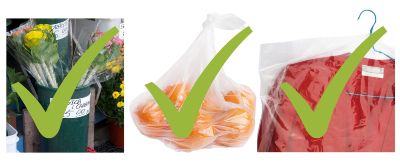
See our Fact Sheet, Guidance and FAQs, Sustainability Tips for Food & Beverage Containers, and COVID-19 and Reusables Tips for Businesses.
According to the Vermont Department of Health, reusable bags are safe to use, even during the COVID-19 pandemic. See our Tips and FAQ for more information on safe use of reusable bags.
Translations of a SUP Law fact sheet are available in the following languages: Arabic عربي, Chinese 普通话, Bosnian Bɔ̌sanski, Burmese မြန်မာစာ, French Français, Japanese 日本語, Nepali नेपाली, Russian Русский язык, Somali Soomaali, Spanish Español, Swahili Kiswahili, Vietnamese Tiếng Việt.
Why did Vermont pass a single-use products law?
To lessen the harmful effects of single-use products and to reduce the amount of single use products Vermonters landfill. Preventing waste has the best environmental and social benefits and saves money. Single-use items, paper, and packaging make up almost 1/3 of Vermont's trash.
Go to the Vermont Legislature to read the full bill (Act 69 of 2019, as enacted).
To learn more, visit the 2019 Single-Use Products Working Group's legislative page or read their final report.
Download our BYOBag sign, poster, and info card, or our Straws by Request sign.
What do I need to know?
Plastic Bags
Stores and food service establishments may no longer provide plastic carryout bags at check-out.
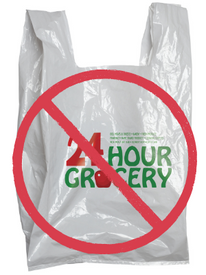 Plastic bags are allowed in stores and food service establishments for:
Plastic bags are allowed in stores and food service establishments for:
- Containing loose objects within a store:
- Packaging loose items, such as fruits, vegetables, nuts, coffee, grains, bakery goods, candy, greeting cards, or small hardware items
- Containing frozen foods, meat, or fish
- Containing or wrapping flowers
- Containing prescription medications
- Containing laundry, dry cleaning, or other large garments
Paper bags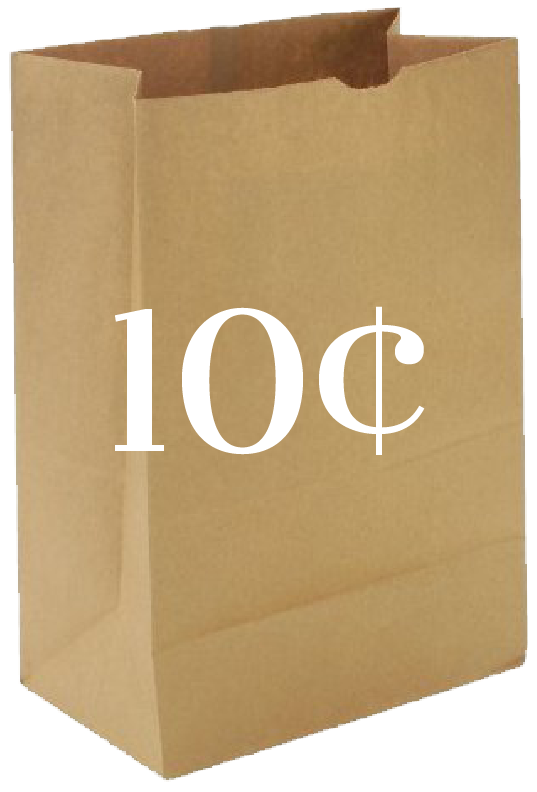
Stores and food service establishments may provide paper carryout bags at check-out, for a minimum of $0.10 each.
The $0.10 fee does not need to be charged for small, lightweight bags (generally shorter than 10 in. or with a basis weight of 30 lbs. or less).
Paper bags are allowed in stores and food service establishments for packaging loose items within a store, such as fruits, vegetables, nuts, coffee, grains, bakery goods, candy, greeting cards, or small hardware items
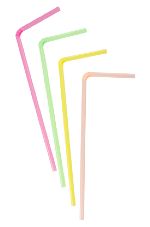 Plastic Straws
Plastic Straws
- Food service establishments may no longer automatically provide plastic straws to customers.
- Food service establishments may provide straws made from an alternative material (not compostable plastic).
- Any customer may request a straw.
- Hospitals, nursing homes, and other care facilities may continue providing plastic straws.
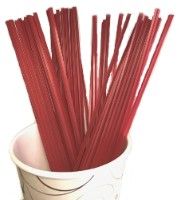 Plastic Stirrers
Plastic Stirrers
- Food service establishments may no longer provide plastic stirrer sticks to customers.
- Food service establishments may provide stirrers made from an alternative material.
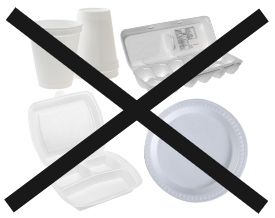 Expanded Polystyrene
Expanded Polystyrene
Stores and food service establishments may no longer provide or sell food or beverage containers made of expanded polystyrene including:
- Plates and cups
- Trays
- Egg cartons
- Take-out containers
Expanded Polystyrene is still allowed for: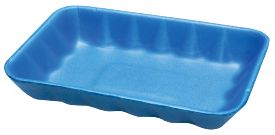
- Trays used to package uncooked meat, fish, poultry, or seafood
- Products packaged out-of-state
- Products packaged for sale out-of-state
FAQs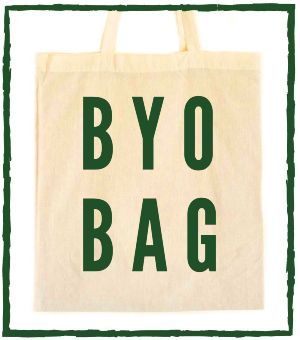
What can I do?
- Bring your own reusable:
- Bag when you go shopping
- Straw, if you prefer to use them
- Travel mug and refillable water bottle
- Container for leftovers when you eat out
- Consider working with your local community to set up a leave a bag, take a bag program
- Consider eating in instead of getting take-out
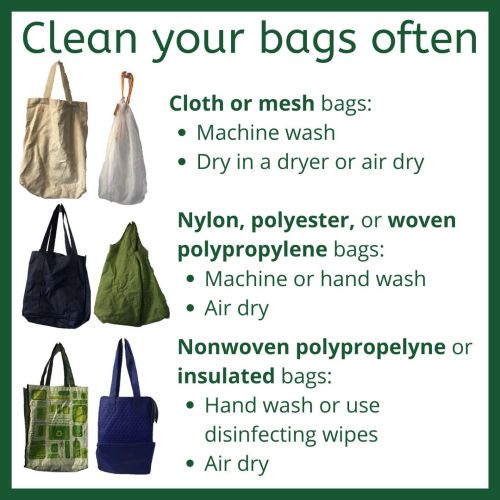 What locations are included?
What locations are included?
- All retail stores of any type
- All restaurants and cafeterias of any type
- Farmers’ markets
- Food trucks
- Food/shopping delivery services
When did this law go into effect?
July 1, 2020.
Are thick or compostable plastic bags allowed?
No. The law bans all types of plastic carry-out bags (provided to customers at the point of sale), including thick plastic bags, like from clothing stores, and compostable plastic bags.
Can I still use plastic trash/dog poop/snack bags?
Yes. This law does not ban the retail sale of plastic bags or other uses of plastic bags.
- To reduce waste, consider reusing other types of plastic bags, such as bread bags or produce bags, for pet waste and as can liners. Consider replacing snack bags with reusable containers.
Are compostable straws allowed?
No, the ban on automatically providing straws includes straws made of bio-based or compostable plastic.
Can I still buy plastic straws and expanded polystyrene food and beverage products?
You can still buy plastic straws (although consider switching to reusable straws). You will no longer be able to purchase foam food and beverage products in Vermont stores.
Is the paper bag fee a tax?
No. Stores and restaurants will keep the money to help compensate for the higher cost of paper bags.
Aren’t plastic bags recyclable?
Yes, at designated drop off recycling locations, but not mixed in with your regular blue bin recycling because they get caught in the machinery, where they are expensive and dangerous to remove. Never bag your recyclables and never place plastic bags or film wrap in your curbside recycling bin or dumpster. Plastic bags and many other types of film plastic can be collected separately for recycling at some grocery and department stores, and even at some recycling centers and transfer stations.
Is this a landfill ban?
No. It is not against state law to throw plastic bags, straws, or expanded polystyrene products in the trash.
What if my town already banned plastic bags?
After July 1, 2020, the state law applies in all of Vermont.
Are there any trainings available?
Yes, this video gives an overview of the Single-Use Products Law.
How can I learn more?
Check out the Guidance & FAQs handout. Still have questions? Contact us at 802-828-1138.

